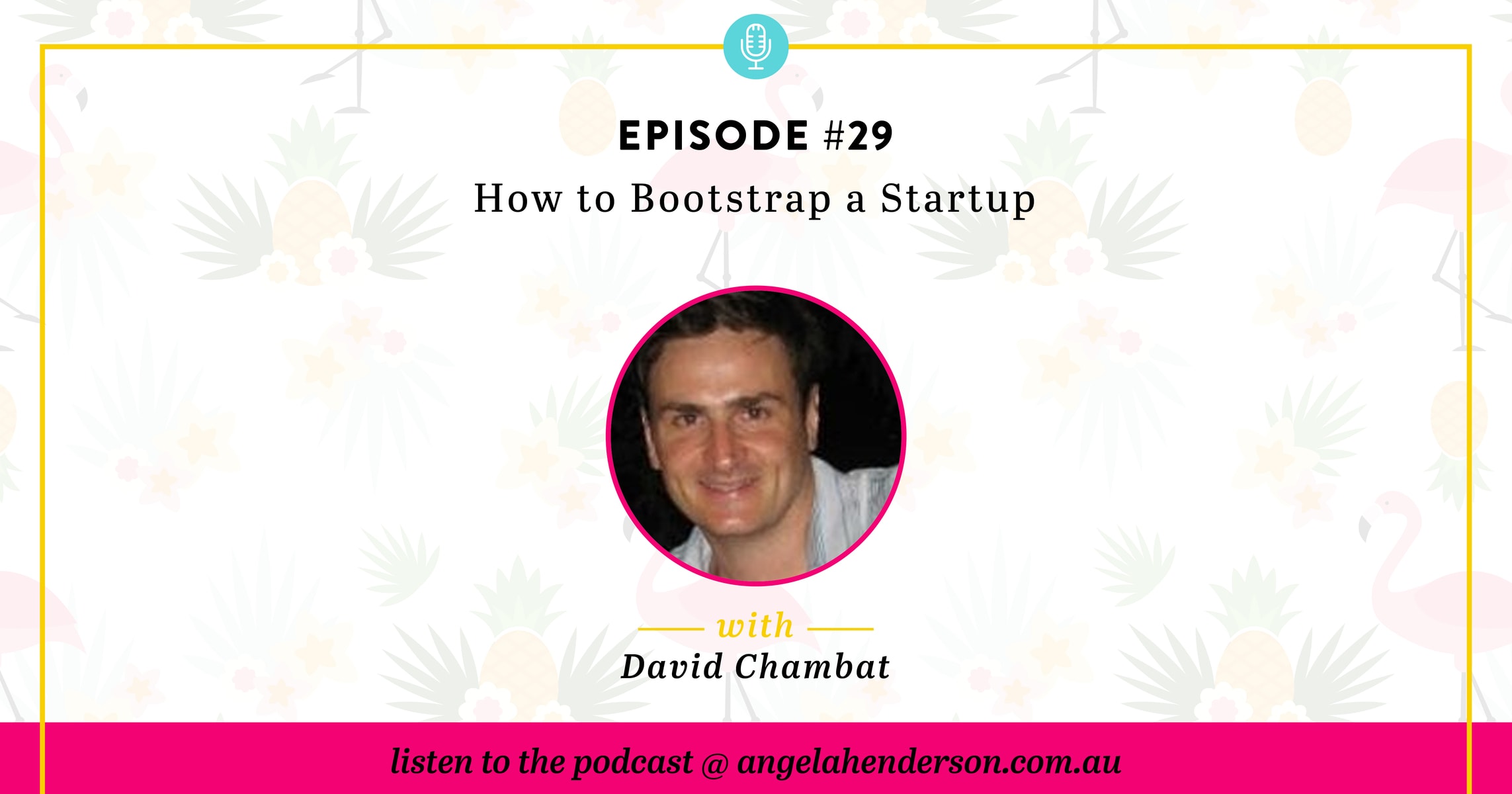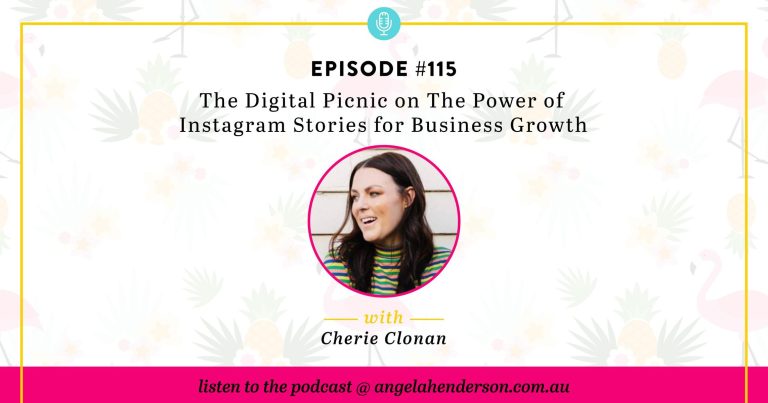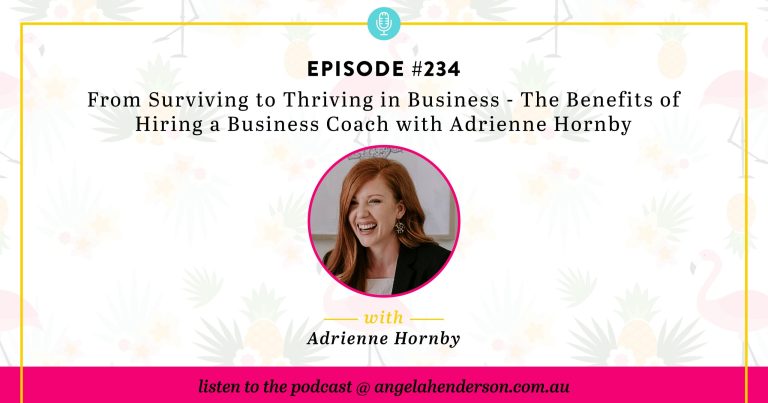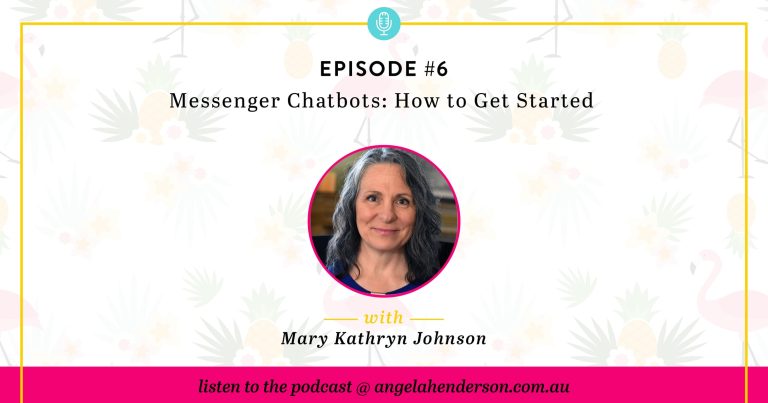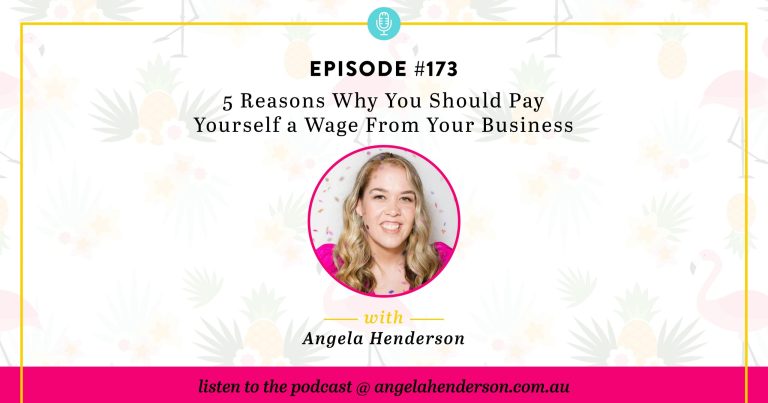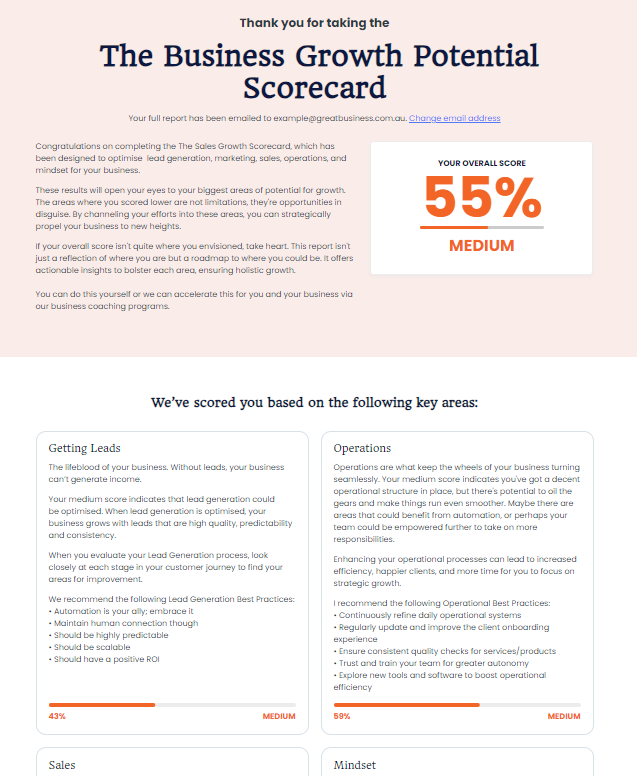Are you looking on how to bootstrap a business the right way? Is bootstrapping a business right for you? David Chambat, CEO of Villa Finder, answers these questions and shares his experience and knowledge on everything about bootstrapping a startup in this very interesting Business & Life Conversations podcast episode. To guide us in the right direction, he discusses the benefits of and the biggest mistakes you may encounter in bootstrapping. He also shares the importance of the learning curve that every business owner has to go through to be successful in business and the things to consider and know when going through this process. Finally, David also willingly gives us his top 5 tips on how to bootstrap a startup correctly.
Important Links Mentioned in the Show:
Angela Henderson Active Business Facebook Group
Angela Henderson Facebook Business Page
Prefer to read How to Bootstrap a Startup? Here’s the transcript:
ANGELA:
You’re listening to the Business and Life Conversations podcast, with Angela Henderson, episode 29.
Hey there, you’re listening to the Business and Life Conversations podcast, my name is Angela Henderson, and on this show we talk about improving your business, life or both. By having amazing and rich conversations with brilliant guests. Who will inspire you and who will give you tips and tricks, to help you grow both in life and in business.
Hey there, and welcome back to Business and Life Conversations podcast with Angela Henderson. And I’m your host, obviously Angela, from Angela Henderson Consulting, and I’m so thrilled that you are tuning in today. On today’s podcast I’m excited to have David Chambat, the founder and CEO of Villa-Finder, who’s going to be talking with us today about how to bootstrap a startup. What are the benefits of bootstrapping? What have been the biggest mistakes, either himself or others have made with bootstrapping, and what are his top five tips on how to bootstrap a startup correctly.
So welcome to the show, David!
DAVID:
Yeah, good morning! How are you?
ANGELA:
I’m good, how are you? So now I know you’re from France, but where are you currently based?
DAVID:
So I’m based in Singapore, I’ve been living in Singapore now for 12 years, and that’s where we started our business from.
ANGELA:
Fantastic, I was just in Singapore for a short layover on my way to the Maldives last week. It’s a phenomenal airport, Singapore is.
DAVID:
Yeah, it’s been voted the best airport in the world for many, many, many years now. I think it’s winning all the possible awards, it’s a beautiful and very comfortable airport.
ANGELA:
Gosh, I mean I was in there and it’s like a sunflower garden, there were cinemas, there was massages, you could rent a bed space for a short amount of time, and the food was brilliant. So, gosh, if you’re ever going to get stuck in an airport, I would say Singapore is the airport you want to get stuck in.
DAVID: Yeah, definitely.
ANGELA:
So yeah, as I was just talking to you prior to us starting the recording for this podcast, it’s a very, very small world because my first business, which is still going, Finlee and Me, I actually have been working with one of your employees named Lucy Evans from Bali-Villas, which is an arm of your overarching Villa-Finder branch. So I always have to giggle when the world connects us with people, because it’s truly is a small world.
DAVID:
Yeah for sure, no for sure it’s a very small world, and I think there’s a very strong link between Australia and Bali, and most of our business is still in Bali now, so I guess we have a lot of touch points down there in Australia.
ANGELA:
Absolutely, us Australians, especially when we travel with small families we find we wanna go places that aren’t going back to my homeland Canada, or traveling to the U.S. where it’s 14 or 16 hours, you know? Again, Bali is just five and a half hours from Brisbane, it’s like, if the kid’s going to scream it’s only a short plane ride that you have to deal with it. So no, Bali is definitely a tourist destination for many of us local Australians.
DAVID:
For sure, we see you guys a lot in Bali, the streets of Bali. That’s a great destination.
ANGELA:
Yes, but I totally agree. So now before we jump into everything about bootstrapping, I’d love for the audience to get to know you a little bit better, because you have a very amazing and juicy history, as I was researching you prior to this podcast.
So would you mind telling us a little bit more about Villa-Finder, a little bit about your history, and since obviously you’ve travelled extensively in your life, I’m dying to know your favourite holiday destination.
DAVID:
Well, I mean I basically always worked in tourism, I started in a carrier in an airline, I worked years for Air France and then for KLM when Air France and KML merge back in 2004. From there I moved into the hotel worlds where I worked for a hotel video solution called tvtrip.com So I did that for another four or five years and then I left this company to start my own business, which was at that time was villa-bali.com but became later on villa-finder.com.
So, how this start, funny enough I almost bought a villa in Bali, that was back in 2012, six years ago. So I sent some money to buy this house, and then in the process of buying it I was researching how I could rent it in the future. At that time, again, six years ago, there was no way Airbnb, there was no HomeAway, or there is no other way at that time so I realised there wasn’t much happening on this space. So instead of buying the house, I just invested it to a domain name and a few interns at that time just to start this business, and get it going. Then that became successful very fast, so then we properly started it with a real team and etcetera.
ANGELA:
How fun is that though, and so again you were going to do one thing and then you decided to put the money into a URL domain name, and here you are today.
DAVID:
Yeah, I mean this is really about.. I think it all comes down to a timing. I think the main factor of success for a business is very often being at the right place at the right time. I wouldn’t have started this business two or three years ago. Now the market has suddenly changing and it’s a much more difficult market to enter. Especially, as we’ll discuss later, if you wanna bootstrap a business, meaning you are starting a business without too much money, that would be impossible now. But five, six years ago that was possible. So it’s all about timing, and starting it right when the timing is right.
ANGELA:
I agree yeah, there’s a timing is a huge element, and I also think knowing the market because before, as I was saying, I was doing some research for this podcast, and I found there was a survey done with 316 business owners, and they listed the five key reasons why entrepreneurs aren’t executing their business ideas. And funnily enough, at the top of that, 41.2% of those that were surveyed said knowledge, they just didn’t have the knowledge base. Directly after that was 32.3% said that it was funding, and below that, one of the other top three was around not being in there at the right space. Which is funny you’d bring that up because it’s a great segment into what we’re going to talk about today and that is really your topic about how to bootstrap a startup.
So tell me, ’cause not a lot of people in the audience might not have ever heard the term bootstrapping, or they may have heard it but for the purposes of this particular podcast, I’d love for you to give us your definition of what is bootstrapping.
DAVID:
So, in business terms, basically bootstrapping is starting a business from scratch without any external help. So basically, any external finance. So the short answer is, bootstrapping means you finance the business yourself. So you know that of course if you want to start a business, there’s a few different ways to finance it from. You can either finance it with your customers, which is usually what you do when you bootstrap. You can obviously raise money from in the store, you can raise some debt at bank, you can raise money from friends and family, or you can take from your own savings.
So really bootstrapping is that solution, where you take from your own savings, when you take money from your customers, obviously. And so you start with no help. So that’s the short answer, I guess the broader answer is really that bootstrapping is a mindset. So, it’s really about starting a business with every action, especially at the beginning being a lot of thought before you buy anything, before you hire anyone. So it’s really discipline, which you actually embed into the business and into the startup culture as well.
ANGELA:
Funnily enough, again, with the bootstrapping, some additional research I found is that collectively 80% of startups are actually funded through personal funds, credit, family or friends. In the U.S. through the small business administration they released data starting that the number of startups that initiated was basically, again as we said, 80% was through personal savings credit, which then was followed by family and friends, then venture capital, angel investors, bank and last was crowd funding. But to think that 80% of startups are funded through their own personal funds is quite a big number. Would you agree, disagree? What are your thoughts about that?
DAVID:
Yeah, I mean that’s what we see a lot. I mean see that a lot in Singapore actually, so here in Singapore there’s a growing system of startups, so we have way more startups, whether they are small or not that small anymore. And a lot of the startups are actually bootstraps.
And actually, I would even argue that most of the startups who end up getting venture capital money usually started bootstrapping, because if look at the Airbnb story, for instance, the founders of Airbnb for their first 12 months or 24 months they were purely bootstrapping, and they were setting their sales, their sales before actually going into raising money and properly starting Airbnb.
So, I think there’s a lot of, also, again the mindset. Even if you raise some money at the end of the day, or after one or two years, I think that you can still be considered as a bootstrap company in many ways.
ANGELA:
And in your own experience and then obviously living in Singapore for the last 12 years and seeing an enormous amount of growth from the entrepreneur space, what do you think are the benefits of bootstrapping?
DAVID:
Well I think the first benefit, maybe the most important one is that you have to be customer focused. So if you’re bootstrapping, again, you’re not getting any other money than the money you can get from yourselves, from the customer. So if I think back six years ago, when we started the business, I was answering all the customer calls and all the customer bookings myself. I didn’t have a team.
So, the company and myself were completely customer focused, and I think that’s a big benefit as opposed to if you’re raising money, then you’re gonna spend more time maybe seeing investors and presenting your business case and going to conference etcetera. I think that’s a wider benefit. I think on top of it, obviously because you are not hunting for investment, you spend more time focusing on your business, focusing on how to deliver better product, how to reach out to more customers etcetera.
And then of course, like I said before, I think it’s also a mindset becomes a financial discipline, and I think that’s also.. when you don’t have the money, basically you can’t spend it, obviously. So, it kind of steers your financial discipline, the way you pay your suppliers, the way you will hire etcetera. So that habitual discipline, which actually interestingly enough, I mean we’ve been profitable for more than five years, but we kept that discipline of not over hiring or overspending money.
I think that’s in our genes, and if I compare myself to other companies that I meet in Singapore that I raise capital, I think if you on the opposite, you take in the mindset or the habit of overspending, it’s extremely hard to step back. If you’ve taken a very nice and very beautiful office from day one, and if you have a CFO and you have a HR manager, and you have all sort of support people in the company, it’s very hard to get rid of all that overhead later on in the process.
ANGELA:
So really, ultimately, what you’re saying is that with bootstrapping the mindset is there, but in addition to that is that there’s a lot of work, it’s kinda like you’re so hands on, and so you really quite are so in-tuned, and because you’ve had to go through the processes and the procedures and the ups and downs yourself from a hands on versus have already outsourced. By the time you get to an element where you are able to outsource, would you agree that you probably have such a sound and better understanding of how your business works, opposed to potentially people who might get venture capital etcetera, and jump right in and start outsourcing before they’ve actually been in the trenches?
DAVID:
Well I mean I don’t know if it’s a better view of the business, I think there’s also a lot of benefits of having excellent investors, and for sure you will get other feedbacks, and you will also have a very intimate view of your business. But, for sure, when you bootstrap you really have to be on the ground. So, if I take my personal example, when we started Villa-Bali at that time, the first 50 villas, or let’s say even the first 100 villas on the website, I personally inspected and signed them all myself.
So I was on my scooter in the streets of Seminyak and Chango, visiting each and every villa for three, four, five days. And signing those towards 50 or 60 villas that we needed to launch the website. Because I knew all the owners, and I knew all the prices and all kinds of information, I got to know that business inside out.
And I think that even though maybe I don’t do that very much these days anymore, I mean I still I have this intimate knowledge of how a company either works and how it thinks of these agencies etcetera, etcetera. I think this is extremely precious.
ANGELA:
And because of that experience though, what have you seen in yourself or with others is the biggest mistake people make when it comes to bootstrapping?
DAVID:
Well I think a mistake that we made, maybe a little bit later in the process, I would say after two or three years, is that because of that financial discipline there can be a tendency of underinvesting. So, eventually for those VC funded company that maybe overinvest or have unnecessary overheads costs, but again as a bootstrap company you might have a tendency to underinvest. So maybe not hiring.. for instance in our place, because I also like numbers, I did the accounting for the first, I don’t know maybe two and a half years? And I think it was too long, I should have taken maybe an accountant on board a year before, or 18 months before and spend maybe more time finding new destinations or signing more villas etcetera.
So, I think there’s that list of underinvesting and doing all the things by yourself, which can actually.. either you can add a betting yourself out or you can just damage the company business.
That’s one drawback, I see another drawback actually now that I think about it, you might end up.. and I think it would be a lot of your listeners, it can be a bit lonely at the top, so I guess if you’re not raising, I mean if you’re doing the things all by yourself or with a very small team, and you don’t have any investor, you don’t have any mentor, etcetera. It could be a bit harder at the top, so you could be a bit alone, and could be also difficult to get feedback from people outside the business. So, I think it’s also important when you bootstrap to maybe set up kind of a small committee, or maybe not a board, a proper board, but a least a committee or you can organise feedbacks from people from outside the company as well.
ANGELA:
Yeah and I do say that often, whether or not it’s bootstrapping, angel investors etcetera, is that sometimes again that loneliness. Especially people who’ve come from corporate, and you’ve been in corporate for so long, and you can have your lunch breaks and you’re surrounded by people and there’s always people to talk to, and then the next thing you know you’re like, talking to yourself. You know, like, “Oh okay well there’s a computer and myself.” And that, again, sometimes it can be hard for people to ask for that help too because they’re like, “Oh, if I’m seen as being asking for help then maybe they don’t think I’m successful, or they don’t think they know what I’m doing.” So often I get a lot of people that I work with that I’m like, “No dude, it’s okay. Ask for help. If you’re asking for help, you’re probably helping other people who might not be confident enough to ask for help.” It’s not a sign of weakness, it’s actually a strong thing to surround yourself with people who can help you grow.
DAVID:
Yeah for sure, and I think another side of it is that, if you bootstrap and if you don’t equip yourself with enough people etcetera, you would also end up multitasking all the time. So doing 10 things at a time all day and all week long, all month long, all year long, and it can also be extremely difficult and even dangerous from a health perspective. Of course, not everyone can also multitask, I mean there’s some people who don’t like numbers, who don’t like the, etcetera. So you also again need to find the right balance.
ANGELA:
Again, you touched upon there is that for example, I’m not an accountant, so I had to outsource very early on, because that’s just not my zone of genius. And so again, I think it’s about identifying, when you do decide to bootstrap or not bootstrap, be able to grow your businesses. Look at, what are your strengths? What are you really good at, and what do you hate doing, or what is just not your skillset? And outsource accordingly.
It’s also important, you know, don’t be afraid to startup small, you might not hire an accountant full time, you might hire them as a contract basis, and you grow as your business grows. ‘Cause I do see, I think what you said earlier, is people will start employing all these people, but they don’t have the money to pay for full time wages. So again, hire people as you need and start this contract, they don’t have to be employees right off the get go.
DAVID:
Yeah for sure, just to give you an example, so we started our business out of Singapore, and then we again started the business with villas only in Bali and then we did extend to Thailand, Sri Lanka and Mauritius once we found the process, but when we started Bali we didn’t have a local office in Bali. Most of our property owners were asking us, “so where is your office, that’d be great, blah, blah, blah.” So what we did, instead of putting a proper office with the property, we just hired a couple of contractors, or a couple of freelancers. A German guy and his Indonesian girlfriend were acting as our local reps, and we were paying them by the time they were using.
So that did cost us the fraction of one salary, instead of giving us all the headache and all the cost of a proper office. And then down the road, after a year and a half, when we had sufficient business, then we started a proper office for the company in Indonesia, and now we have 25 people there. But, again, it’s a process very early, and I always say it’s always better.. You really need to have the customers first. Once you have the customers and revenue, then you have to have the structure to actually take care of it. But worry about your customers first.
ANGELA:
And I also think that so often, so many people, they don’t want to get their hands dirty, or they don’t want to.. but then sometimes again it comes down to.. I’m not a huge fan of the word hustle, I think you have to work hard. I don’t think you have to hustle. But, again it’s one of those things that sometimes people want to jump a few steps. And they wanna go straight from opening a business to having that team, but sometimes you have to go through that process. And sometimes you gotta do things that you might not be good at, or things you don’t want to, but as soon as you can, I think it’s important to understand that there’s a process when we startup a business.
DAVID:
For sure. That’s a very steep learning curve, so that’s a learning curve and you have to learn inside out from your customers, from the suppliers. So, in our case we have customers going into the villas, and we have suppliers who are villa owners, so we have those two minds and that we have to understand to run this business, and I think you can’t succeed if you don’t go through that learning curve. So even though I was in the tourism business before, and I did work with hotels before, I guess an individual property owner, his values gotta fill out with the villas, it’s totally different reaction from a hotel manager in Singapore or in Hong Kong. You need to sit down with then, you need to spend time with them and there’s this learning curve.
Especially, there’s always those two critical years, the first two years, where you have to build the product, talk to your first customers, get your first sale, which is bookings in our case. In our case, get the first customers into the villas, get their feedback, get the feedback from the villa, from the people working in the villas etcetera, to really understand how it works and to be able to scale the business. So those first two years where you understand the product are really crucial.
ANGELA:
So often I also see people, one of the things they wanna outsource right off the bat, is selling. I strongly stand by this, that I believe that in order for your business to be successful, you have to be the person selling on the ground for at least the first six to 12 months. You have to understand your customer, you have to understand your product, you have to understand how to execute and finish that sale, how to start the sale. And so, often I’ll see people go, “Oh but I don’t like selling.” But I’m like, “You have to know how to sell your own product, it’s just not going to work.”
DAVID:
Yeah, usually I would agree that if you start a business, you must be loving your product, right? I’m sure you do love your podcast and your blog, and you know we love our villas. If you start an ice cream business, I guess you love ice cream. So I guess if you love your product, there’s no reason you wouldn’t go out and sell it. Even if you think you’re not a sales-person, I would think that if you like your product, you’re certainly a better salesperson than you think, for sure.
ANGELA:
Exactly right. So tell me, do you think bootstrapping’s for everyone?
DAVID:
I mean, like you said before, you said 80% of companies are bootstrap, so I think a lot of companies can bootstrap. Of course, there’s a few exceptions. I think the number one big exception, if your business requires a big capital investment, if you’re starting the next, I don’t know, spaceship company, you will need a little bit of capital investments. So anything that requires capital investment, even a restaurant, if you start a restaurant with a proper professional kitchen, maybe it cost you two or $300,000, you would need capital investments. So there’s a few instances where you really need capital investment.
There’s another type of business, which is actually the company I was working for before tvtrip.com where we were in the B2B space, we were selling hotel videos to hotel and we were making money out of the broadcast of those videos onto booking.com or at chalets etcetera.
So in those kind of B2B businesses, where the sale cycles are long, and where you usually get paid once a product is actually completed, it’s also a little bit more challenging to purely bootstrap, because.. again at TVtrip, there was a long time before we could convince a hotel to join us and be part of the video we’d actually provide, it would be maybe six to nine months. So you need to build up the whole team and the whole product phase before you can actually get revenue. So, in those businesses that are by a sense negative in cash flows, you would also need to find a way to actually bridge finances.
ANGELA:
And speaking of, again, just that should people bootstrap or not, I also think it’s important that there’s a big push in the entrepreneurial world, or small business world, or just business world, talking about, “Quit your nine to five. Just jump right in head-first.” And I disagree with that to an extent because I think, if you’re gonna bootstrap it, and you just got a new baby, or you just bought a new house, or your honeymooners or whatever, there can be an enormous amount of pressure on the family dynamic. Just starting a business, and then starting a business bootstrapping it. You know? Like, there are things, marital breakdown, bankruptcy, I mean there’s a whole list of things that could go bad when you are bootstrapping.
So again, I always say, don’t just necessarily jump from the nine to five, unless you’ve got a little bit of a buffer zone, unless your partner really understands, because for the longest time with Finlee and Me, I worked as a mental health clinician for my entire time, so I worked eight-hour days, ran that first business, started this business.
Some people thought I was a little bit crazy, but at the end of the day I had four weeks annual leave off, I had two weeks holidays, or two weeks sick leave. I then bought four weeks of purchase leave, I also had one roster day off a month, I also had 13 public holidays. So, out of that year I was actually only at work for like seven months and one week, I think. So, I was still able to grow my business at the same time without putting that additional stressor, even though we bootstrapped it. I didn’t have that additional stress, because I was able to still have money coming in at the beginning when it was slow, because it was an e-commerce platform.
So you know, just be mindful of that if you’re out there listening, thinking about starting a business, and how you’re going to bootstrap it. Don’t necessarily just jump from the nine to five.
DAVID:
Yeah, for sure, and I think these days also it’s getting really much, more and more affordable to actually start a business. I mean now, access to technology is extremely affordable. I mean, so I started working in the internet industry about three years ago with tvtrip.com, and at that time when you wanted to start a proper website, and in our case displaying videos, we did need four or five developers full time for six months, whatever, so the cost of starting this business was maybe half a million dollar, in any case.
Now, with all the platforms that are easily available, like WordPress, and a lot of them, you can really start something, and you can learn online, you can do an online course, learn how to use a simple CMS system just to start a website. You can start on Instagram, you could start on Facebook, I mean there’s a lot of small businesses that you can start from home at very, very low cost.
ANGELA:
And that’s the thing, is there’s so many resources on YouTube, you know? There’s an enormous amount of accessible knowledge business wise, where, like you said, ten, 15 years ago the internet wasn’t as where it is now. We were having to just live and learn, I guess, make mistakes, move on. Whereas now, there’s quite solid foundational information out there to help businesses.
DAVID:
Yes, yes there is a lot of information online, and I think what’s interesting as well is that there’s also a lot of communities in the real life. I mean, I said in Singapore a lot, I don’t know, I’m sure it’s the same in Brisbane or in Sydney or in the major cities in Australia. There’s a lot of founder’s meetups, entrepreneurs’ meetups, so we have lot of these here in Singapore around technology, tourism, around different things. So, it’s also easy to meet people and share your concern, share your problems. And we have lots of workshops here about how to finance company, how to be a better salesperson, etcetera.
So it’s easy to get all of this. And I guess there’s a lot of ecosystems that wanna promote entrepreneurship. Up in Singapore is a big one, so Singapore does invest a lot of money in actually promoting entrepreneurship. There’s a lot of accessible workshops, seminars, conference that are free of charge that you can attend.
So I’m sure if you check in your city, you can find that support groups as well in the real life. I think it’s important to also look for groups in the real life, because like I said before, you can get a little bit lonely, especially if you do 100% digital business. If you’re staying home, I think it’s great if you go out there and meet other people, and you share.
ANGELA:
I couldn’t agree more. I’m a huge connector, I’m a huge person to person or human to human whatever term you wanna use. And I think the only reason why my business has grown as quickly as it has, and as successful as it is, is because of my connections, and willingness to network with people.
You never wanna be the smartest person in a room. You want to put yourself in those situations like you’re talking about in Singapore with the different groups they have, we’ve got them here in Brisbane, continue to push yourself, go into uncomfortable situations. But the amount of support you’ll have, and wealth and knowledge you’ll get from those communities, is hands down one of the best things you can do.
DAVID:
Sure.
ANGELA:
Tell me, what would you say for those listeners out there right now who are thinking about having a business, or they’re currently in this kind of process where they are bootstrapping, but they’re like, “Ooh, do I need investment?” Give us a couple tips when it comes to how to bootstrap a startup. What do they need to really consider?
DAVID:
Well I mean, I think first of all, like I said before, be the first salesman or saleswoman of the company. I think that’s most important, like you said as well, I think it’s the most important angle, you need to listen to customers, you need to talk to customers, you need to sit down with them, understand their problems, understand why they need your product and how much money they’re willing to spend, what type of service they’re actually expecting, etcetera. So, I think that’s the number one tip that I can give.
I think later on in the process as well; my second tip would be that you have to hand that bootstrapping into the company culture. It’s nice to start bootstrapping, it’s maybe a little bit harder even to keep that discipline and to keep that company culture. So, that’s what we do very much at Villa-Finder, I mean the people we work with, we’re really trying to assess that mindset, that attitude. So, in all our interviews we looking for people that have that commitment, that focus on the product, that focus on the customer. I think now, after six years, it’s really embedded into our company culture, and I think it’s very important to fight to extend that to your whole team and to your whole company as you grow.
Maybe last one. Another tip is you really have to focus on finding a niche. I mean, you can’t just start the company if you go too wide. Like in our case, we are doing very well in a very competitive market. There’s plenty of great companies out there including Airbnb, HomeAway, Wotif, Xperia, but we’re doing very well, and the only reason why we’re doing very well is that we are in a niche. We’re providing a service that no one else has provide, which is a real customer service, a real concierge service in the villas.
Customers are very.. to take the risk and make a booking with us because of that service. Instead of just booking with Airbnb, or with Wotif. We wouldn’t be able to compete head to head against Airbnb, it’s impossible. I think the tip is really to, again, find your niche. Find your niche. Don’t try to go against the very big boys and girls, I mean, just find your niche.
ANGELA:
And I think again, there’s a saying I talk about is, owning your own racecourse, you know? Don’t worry so much about what other people are doing, just focus on yours. And like you, you said, I could talk for hours about the importance of niching. I could do a little rant but I’ll save that for today, but it is important. You can’t be the generalist, you can’t be everything to everyone, so you’ve done a fantastic job with really honing in on.. you’re going to be the best place for people in the Asian Pacific, correct me if I’m wrong, to go and find a particular villa that’s going to be high end. It’s gonna meet the needs of those families, newlyweds, couples, etcetera, versus you’re not trying to be a hotel, you’re not trying to be a resort, you’re trying to be the exclusive villa finder.
That, again, is why, like you said, you guys are doing so well. You’ve found a niche, and you have executed it beautifully.
DAVID:
Thank you!
ANGELA:
Yeah, no, no. So listen, for those listeners that are out there, how can they connect with you? Or, where can they find you if they wanna learn more about you, or about vilkla-finder?
DAVID:
Well you can find me on LinkedIn, of course and you can just search for villa-finder online and you’ll find our website. You can send us a chat or a message and we’ll be very happy to get back to you.
ANGELA:
Gosh, well thank you so much, David, for joining me today here, in obviously in Brisbane and you in Singapore. I appreciate your wealth of knowledge about how to bootstrap a startup and I wish you a beautiful day over in Singapore.
DAVID:
Yea, thank you very much.
ANGELA:
No, thank you and for the rest of you, my team and I will also be putting together the whole transcription for this episode at www.angelahenderson.com.au and of course, I cover all sorts of related business and life topics inside my Facebook group, The Australian Business Collaborative. Of over four, we’re almost hitting 4,000 business owners. So make sure to join the community, I love connecting with you guys and I look forward to seeing you soon.
But until then, have an awesome day no matter where you are in the world. And yes, look forward to you tuning into my next episode of the Business and Life Conversations podcast with me, Angela Henderson.
Have a great day, everyone! Bye.
Thanks for listening to the Business and Life Conversations podcast with Angela Henderson, How to Bootstrap a Startup. www.angelahenderson.com.au.

